Group workshops are a wonderful opportunity for piano students to get together and learn in a different environment. At my studio, I hold a workshop about once a month – and every Piano Party needs a piano party plan.
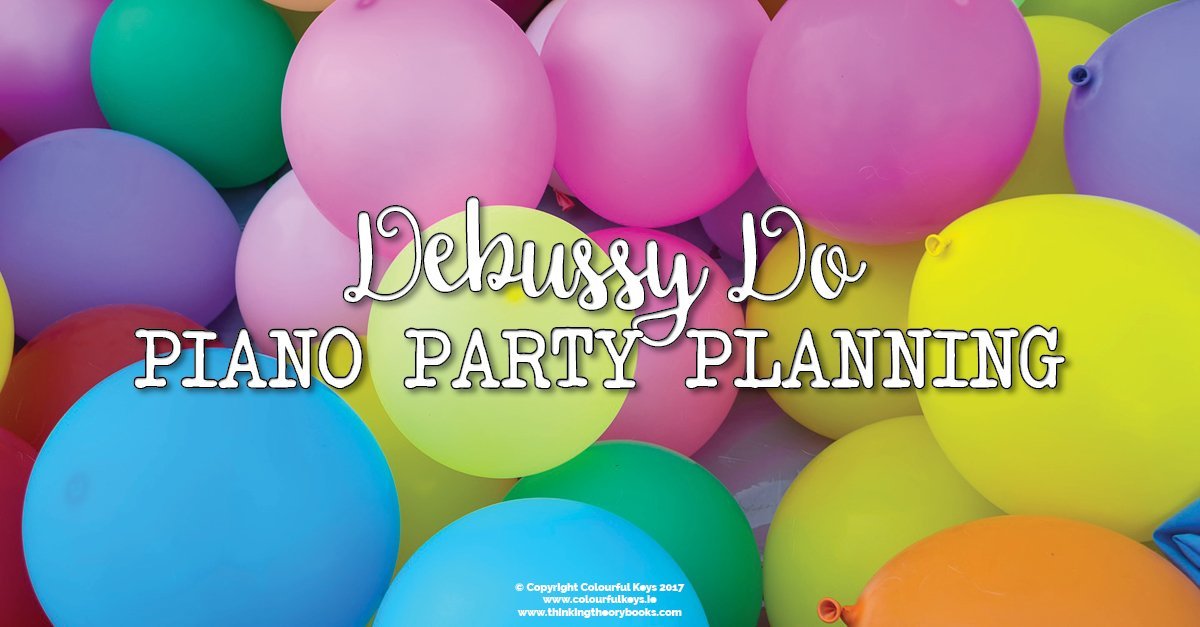
All my piano parties are muti-age and multi-level. Whoever is available is welcome to attend! This is great for bringing students together and it makes it easy for parents…but it does present some unique challenges on the teacher side of things.
This month the focus will be on Debussy, and impressionism more broadly. I love to feature composers in this way and give students a chance to connect with music history.
Piano Party Plans
Plans for a group lesson like this need to be short and to the point. I need to be able to see at a glance what’s next, and whether we’re running on time.
This is what my outline looks like for the upcoming workshop:
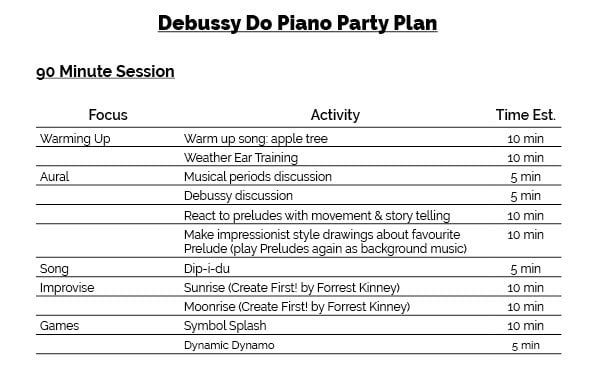
That probably all looks like gobbledygook to you right now. Don’t worry, in this mega post, I’m walking you through exactly what each of the items in my plan means.
I hope it will inspire you to make your own piano party plans.
Singing Games
Singing games that I choose for group lessons and workshops mostly come from the fabulous ‘Singing Games and Rhymes’ by Lucinda Geoghegan. Some of these songs do need creative adaptation for small groups but they’re absolutely beautiful collections.
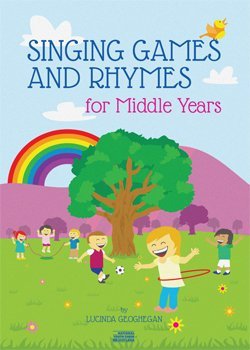
There are different books based on student age, all published by the National Youth Choir of Scotland. The books I draw from most are ‘Singing Games and Rhymes for Middle Years’ and ‘Singing Games and Rhymes for Early Years’. I also have the “Ages 9 to 99” and the “Tiny Tots” is on my wishlist.
For this class I’ve chosen two songs. We’ll be doing ‘Apple Tree’ as a warm-up when students are arriving, and then ‘Dip-i-du’ in the middle of the workshop.
Apple Tree
You can hear the Apple Tree song here, although that’s not the game variation I will be using. The steps I’ll be following for my group are:
- Everyone sings, tapping their knees with the beat.
- We pass a beanbag (i.e. the “apple”) around the circle in time with the beat.
- Students place their hands face up – with everyone’s right hand sitting on top of the next student’s left hand.
- We pass the imaginary beat around the circle while singing, tapping right hand to right hand.
- If my students master these steps we’ll play the full game. The aim of the game is not to catch the beat on the word “out”. So if a student doesn’t move their hand for this word they step out of the circle and we continue.
Practice has taught me to always have something like this prepared for the first few minutes. As the kids arrive, you don’t want to be just sitting there staring at them. You also don’t want to do anything that needs explanation – a song like this is great as they can just jump in once they catch on.
Dip-i-du
I used this song in the first Piano Party this year, Practice Power. It’s one of my personal favourites, so we’re doing it again this month.
Here’s what the song sounds like, and here’s the way I’ll be using it:
- Everyone sings and we clap on beat one. In the 3:4 line we tap each knee in turn, and in 2:4 we tap both knees together.
- I place one drumstick in front of each student, and one in their left hand, and we practice the motions. In 3:4: pick up – tap together – put down to the left. In 2:4: pick up – put down (skip the tap).
- We try the full song a couple of times with the drumsticks. The drumsticks are bound to go flying, so sing slowly!
This song is wonderful for feeling triple vs duple metres, and it’s a lot of fun! It works very well with 4 or more people, three is a bit of stretch for the passes but it can be done.
Would you like to see how these songs fit in smaller group situations?
See this post about planning partner piano lessons. And while you’re at it, read about the benefits of teaching piano in pairs here.
Ear Training
As my second ice-breaker, I’m adapting an activity from the Piano Safari website.
I have done this with animals before and it was a hit. The favourite part was my attempts at drawing animals on the whiteboard. Students thought my drawings were completely hilarious.
This time around, I’m adapting the game to use weather instead. I’ll ask each student for a suggestion of a type of weather to draw, and then I’ll improvise for each one and ask them to guess which it is.
Should be a great way to kick off after the ‘Apple Tree’ song.
Debussy Discussion
When I’m doing a composer spotlight I do include a discussion based section in my plan. However, this is not me lecturing the students about Debussy. This should not look like school!
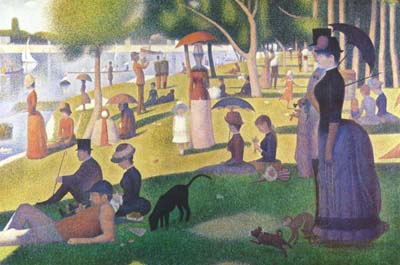
This is a very open conversation and could go many ways. I prepare a short list of topics I want to chat about. Some of the questions I might ask to lead the conversation:
- What do they know about musical periods? What are some composers from each of these periods?
- Has anyone heard of Debussy? Can they guess which period he is from?
- Does anyone know what the art at the time looked like? (I have samples to show them.)
- What else was going on at this point in history?
- Do they think Debussy liked the “impressionist” label? Why or why not?
I have prepared a playlist for this Piano Party (on Spotify here) to go along with this chat. The playlist has a couple of examples from each time period, and then a selection of Debussy Préludes which we’ll be using for the next discussion.
Musical Movement
At the end of this open discussion I’ll be highlighting the fact that Debussy did not show the titles of his Préludes at the beginning of the pieces. He did this so that the performer was more free to interpret and imagine the story behind the music.
Then, I’ll play each Prélude in my playlist and encourage the students to move (sway, dance, march) as they listen. After each Prelude we’ll discuss what they think it is about – there are no wrong answers. I will be encouraging and expanding on each of their musical stories, whatever they come up with.
Group Improvisation
It wouldn’t be a Piano Party at Colourful Keys if we didn’t do some improvisation. This opportunity for students to play together is actually one of my main motivations for these workshops.
This time we’re going to be using two selections from Forrest Kinney’s new books ‘Create First!’ as our jumping off point. We’ll be inspired by the first two templates: ‘Sunrise’ and ‘Moonrise’.
Now, as you can see, this is a duet. It’s not necessarily meant for a bunch of students all together. I’ll be adapting this idea to include:
- A more advanced student playing the secondo
- A beginner on the black keys
- Another on the keyboard with a different instrument sound, playing low black keys
- Everyone else either on a rhythm instrument or in the audience
We’ll swap out as we play so everyone gets a turn in primo. It sounds more musical than you might think, promise!
As we have an impressionist theme – I’ll be showing the students Monet’s Rouen Cathedral series, choosing one in full sun and one in a blue shade to represent the sunrise and moonrise.
Music Theory Games
We always finish a Piano Party with some music theory games. At the Debussy Do we’ll just about have time for two games.
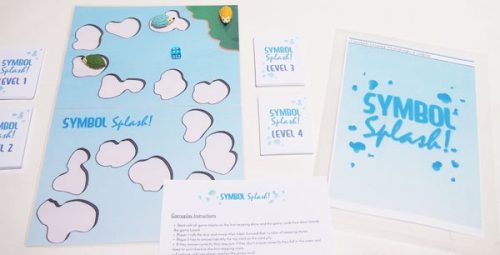
Symbol Splash is a game I shared back in September. This one is great if you have a mixed group because I made different sets of cards for different levels.
Dynamic Dynamo is a really fun card game to practice dynamics. It will be released as part of an interview I did for Tim Topham’s podcast next Friday. So stay tuned for that one.
If you’re looking for another awesome game for group lessons, check out grand staff twister and grand staff beanbag toss. Those are super fun!
How do you make piano party plans?
Do your plans for workshops or groups look like mine? Are you yet to dig in to group lessons or workshops? What’s stopping you getting started?
Tell me your experience with piano party plans and workshops in general in the comments below or over in the Vibrant Music Studio Teachers group on Facebook.
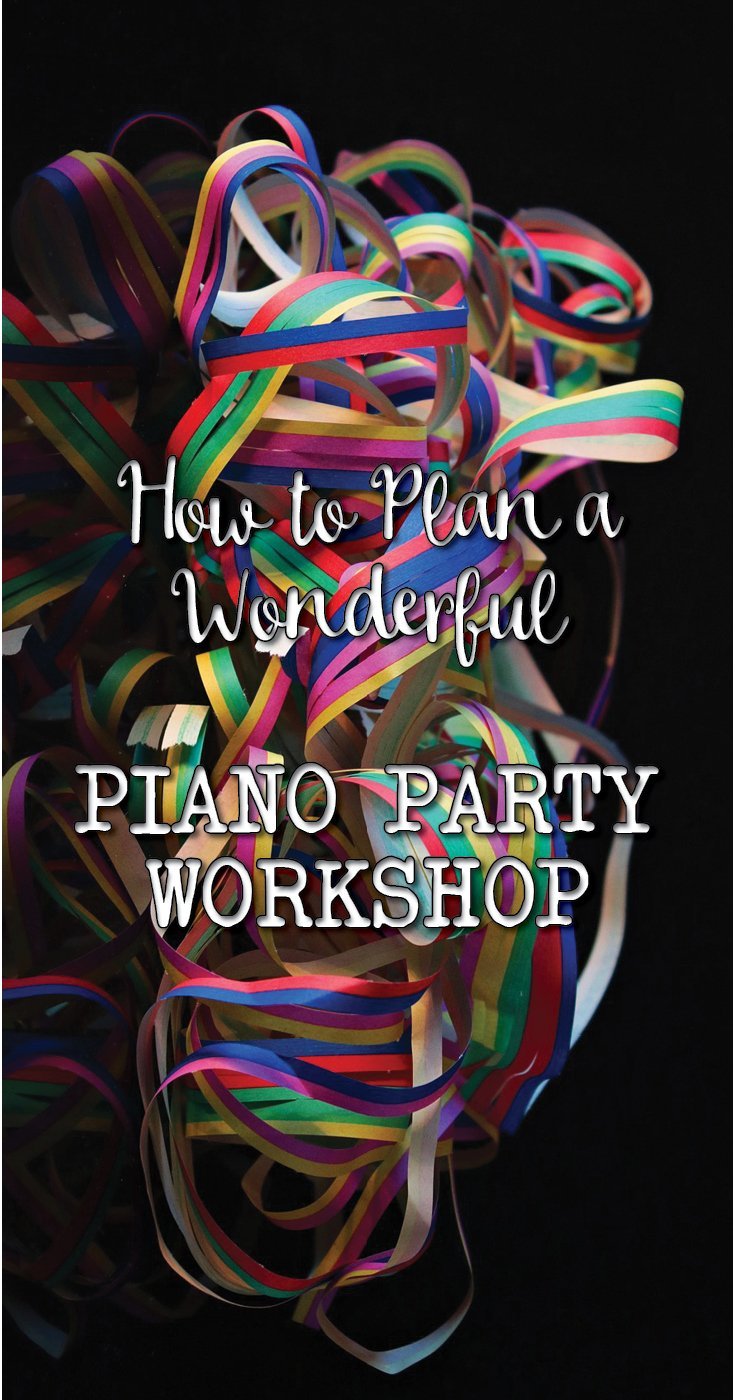
This is fabulous!!! Thank you soon much for sharing your knowledge and experience! It not only informs, but it INSPIRES!
Aw Ilze you’re too sweet, I’m so glad the info was helpful for you! 🙂
Thank you for sharing your experience with us! You’re page has been motivating me to move forward with my group lesson planning. I am constantly searching and developing my lesson plans and teachers like you encourage me to press forward despite the many challenges… I hope to launch this July a new concept called Fun Friday Music Club.. very much like your monthly meets but for now my group will meet every other month. In the past I have done “performance” but have the students fill out a fun point giving form as they watch their peers. Followed by games, art activities that help reinforce music concepts, etc. Will be following your page and hope to share ideas! Love what you are doing!
Thanks Kandice, and best of luck with your Fun Friday Club!